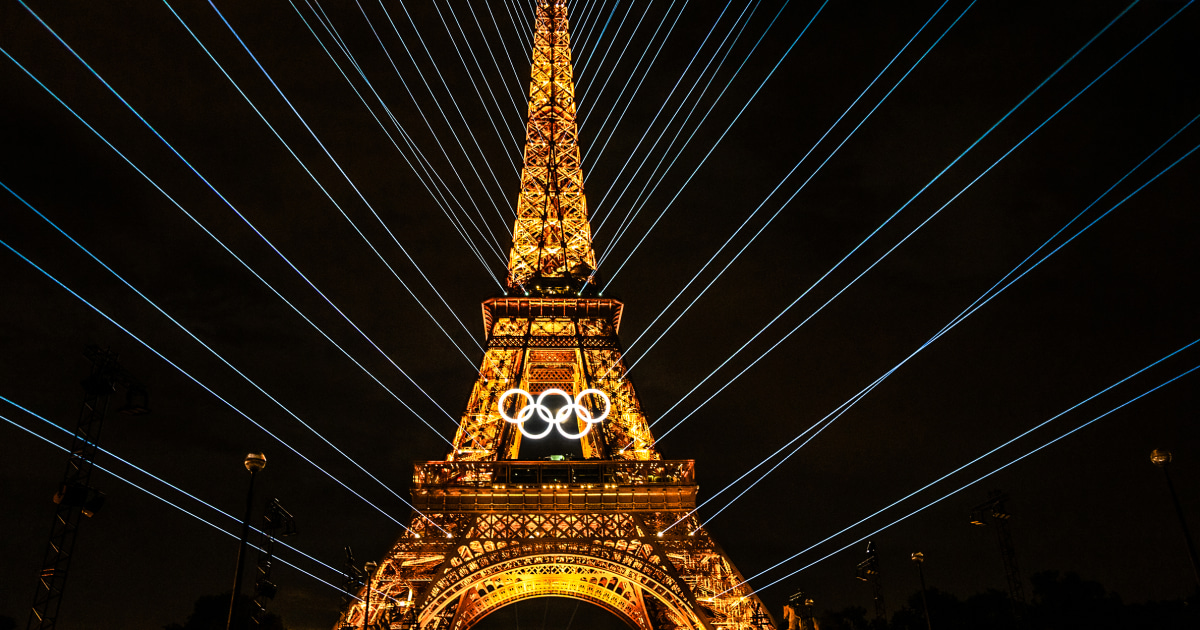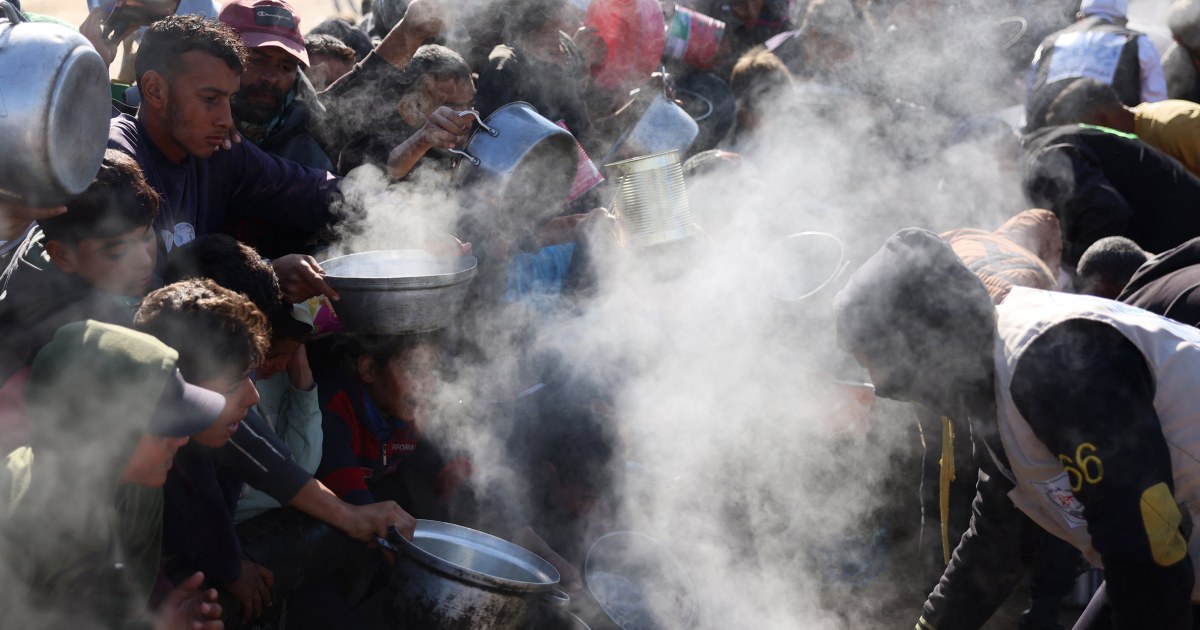World
Paris Olympics kicks off with lavish boat parade, musical performances

PARIS — After a global pandemic and in the shadow of at least three ongoing wars, the 2024 Paris Olympic Games kicked off Friday with a spectacular open-air opening ceremony that aimed to provide relief, positivity and perhaps even unity in a world riven by tension.
The ambitious celebration was unlike any other in the 128-year history of the modern Olympiad. Instead of parading inside a stadium, around 10,500 athletes sailed in a 3.5-mile flotilla of 94 boats down Paris’ iconic Seine River. The uniformed athletes cheered and waved to spectators, keeping the mood boisterous despite the rainy skies.
The ceremony featured a series of high-energy song-and-dance acts, including a cabaret medley from Lady Gaga (who belted out the 1960s-era tune “Mon Truc En Plumes”), a performance from Mali-born French pop star Aya Nakamura, and a tribute to “Les Misérables.” Meanwhile, a hooded and masked figure darted across the rooftops of Paris with the Olympic torch in tow.
Following the procession of boats, flagbearers from every competing nation lined up at the foot of the Eiffel Tower for an orchestral rendition of the Olympic anthem, the raising of the Olympic flag, and the lighting of the massive Olympic cauldron.
The final musical number of the ceremony came from Céline Dion, who performed “Hymne A L’Amour,” a song made famous by the legendary French singer Édith Piaf. It was Dion’s first public performance since she announced her diagnosis of stiff-person syndrome in 2022.
Tony Estanguet, the president of the Paris 2024 committee and a three-time canoe slalom gold medalist, addressed the athletes in introductory remarks and praised them for their dedication.
“Dear athletes, we can’t wait to live it all with you,” Estanguet said. “The joy, the tears, and the love that you will put in each moment. Thank you so much for being here. You made it. Bravo. I know what it means. I know what it took. I know the paths you have followed to be here.”
Gloomy skies notwithstanding, the ceremony was a blockbuster return for the summer sporting festival, which is hosting spectators for the first time in eight years after the coronavirus-plagued days of Tokyo in 2021.
France heightened security ahead of the games, following a terrorist attack in Moscow in April. The raised threat level “is absolutely warranted,” said François Heisbourg, one of France’s top terrorism experts.
Stream every moment and every medal of the 2024 Paris Olympics on Peacock
“Security is a perennial concern for any large international or global gathering, so when you’re talking about the Olympics, security concerns tend to be extraordinarily vivid,” said Heisbourg, who has advised successive prime ministers.
Those fears came into focus hours before the festivities started when France’s state-owned high-speed rail network was hit with “several simultaneous” arson attacks disrupting travel for 800,000 people, government operator SNCF said.
“We ask all passengers to postpone their trip and not to go to the station,” the company said in a statement Friday.
Friday is one of the busiest calendar dates for French vacationers and many Parisians, particularly those unenthused by the Olympics, are planning to leave town. High-speed TGV trains going east and west were “very disrupted,” SNCF said. The southeast route was spared, with the operator saying a “malicious act has been foiled.”
Organizers say the city itself will provide an unforgettable backdrop, with events interspersed among its most recognizable landmarks such as the Eiffel Tower. At the same time, they say the Games will be the most environmentally friendly yet, with 95% of buildings either temporary or already standing — and no air conditioning systems installed in the athletes village bedrooms.
Much of the format of the Games will be familiar. More than 200 national teams are competing across 329 events held over 19 days (some handball, soccer and rugby events took place Wednesday). And in an attempt to appeal to younger audiences, there will be four new disciplines: sport climbing, skateboarding, surfing and break dancing (officially known as “breaking”).
Not all events will be held in the capital, with sailing in the southern Mediterranean city of Marseille; handball and basketball in Lille, to the north; and surfing posted on the other side of the world, on the French Polynesian island of Tahiti.
American supporters will be eager to see if returning superstars such as Katie Ledecky and Simone Biles can add to their medal hauls in swimming and gymnastics, respectively. Or whether the likes of LeBron James and Steph Curry will light up the basketball court.
The nearly 600 athletes on Team USA comprise a talent-loaded roster, with women outnumbering men 314 to 278. There are plenty of new faces, too, including gymnast Hezly Rivera and transgender runner non-binary runner Nikki Hiltz.
With great talent comes expectations, and the United States is forecast to top the table, with 123 medals overall to China’s 87, according to Nielsen’s Gracenote Sports, which supplies statistical analysis for sports leagues around the world.
This pioneering edition of Games is not without its risks or criticisms, however.
The sprawling nature of the opening ceremony and the densely packed events meant an extensive and imperious security operation. Some 40,000 army and police personnel are deployed across the country, and Paris is replete with stringent checkpoints and blanket surveillance.
The Games have stirred mixed emotions among Parisians. A survey last month by the pollster Odoxa found that some 40% of French people do not think the Games are “a good thing,” which has risen by more than 10% over the past three months.
And while the Games’ $10 billion budget is far below that of previous iterations, some French people say this is a waste of money when government debt is spiraling and some economists are sounding the alarm over the country’s finances.
All of this is against the backdrop of a political crisis in France. Recent parliamentary elections saw centrist and leftist coalitions block the far right from power, but in doing so created conditions for a political stalemate that could grip the country for years. (Macron’s second term ends in 2027.)
The Seine itself was meant to be a star of the show. But even that has been rife with problems. A 1.5 billion-euro ($1.6 billion) upgrade to the city’s antiquated sewage system has struggled to get the river’s pollution levels low enough to host the swimming leg of the triathlon and the marathon swim.
In a report issued last week, Paris officials said two heavy downpours in Paris had a “detrimental effect” on water quality, though the quality of the Seine quickly rebounded and “conformed to safety thresholds set by the EU” at the Olympic site for six days over the course of a week.
Paris Mayor Anne Hidalgo, as promised, took a swim in the river earlier this month and insisted it was clean enough for the start of the Olympics.
“The water is wonderful,” Hidalgo told NBC News after she emerged from the water, adding that it was “very cool and very nice.”
In the wake of a deadly virus, grinding wars and rising political division, the world may be eager for some hope and escapism. The organizers of the Games are betting that spectators around the world are ready to take the plunge.
Alexander Smith reported from Paris and Daniel Arkin from New York.










